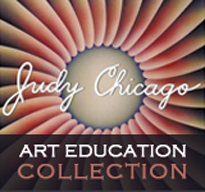Part 4 of the Judy Chicago Dialogue Portal is about “Transforming Curriculum,” and showcases Andrew Perchuk’s lecture “You Say You Want a Revolution: Feminist Art in Southern California” at the Judy Chicago: Planting a Feminist Art Education Archive Symposium at The Pennsylvania State University on April 6, 2014, and sculptor Bill Catling’s presentation about how to achieve a radical transformation in arts education in both policy and curriculum also at the 2014 symposium. Part 4 includes Judy Chicago’s interviews with Perchuk and Catling along with pertinent discussion questions.
Andrew Perchuk is deputy director of the Getty Research Institute. A specialist in modern and contemporary art, Perchuk holds a Ph.D. in art history from Yale University. His publications include The Masculine Masquerade (1996), Allan Kaprow—Art as Life (2008), Harry Smith: The Avant-Garde in the American Vernacular (2009), and Pacific Standard Time: Los Angeles Art, 1945-1980 (2011), which received the 2011 award for outstanding exhibition catalogue from the Association of Art Museum Curators. He served as co-director of Pacific Standard Time, which comprised more than sixty museum exhibitions on postwar art in Los Angeles.
William Catling resides in Southern California, where he serves as professor at Azusa Pacific University. From 2004 to 2014, Catling has been the chair of the art department at Azusa Pacific University in Southern California where he has worked to change studio art curriculum so that it meets the needs of all students.With a career spanning more than thirty years, his professional practice began in the San Francisco Bay Area until he relocated to Los Angeles in 1991. He has been an active speaker and deeply involved in the visual arts and education. An active sculptor, Catling’s work has been exhibited in museums and galleries both nationally and internationally. His current works can be viewed at williamcatling.com.
You Say You Want a Revolution: Feminist Art in Southern California
A lecture by Andrew Perchuk, deputy director of the Getty Research Institute, at the Judy Chicago: Planting a Feminist Art Education Archive Symposium at The Pennsylvania State University on April 6, 2014.
This talk looks at the origins of feminist art in Southern California. It examines the conditions that women artists labored under before feminism and the steps these artists took to intervene and materially change their situation. Artists such as Judy Chicago, Miriam Schapiro, Faith Wilding, and Suzanne Lacy created new models of artistic education, launched groundbreaking projects like Womanhouse, and founded their own institutions such as the Woman’s Building. The lecture presents new research on how feminist artists recast some of the terms of Los Angeles art, transforming supposedly universal and apolitical concepts such as craft, perception, and place into gendered and politically-engaged terms that had a revolutionary impact on 1970s art.
Transforming University Studio Art Education
A lecture by William Catling, professor at Azusa Pacific University, at the Judy Chicago: Planting a Feminist Art Education Archive Symposium at The Pennsylvania State University on April 6, 2014.
This conference session is an exploration of how a studio art program has been/can be built that places the developing student artist as the priority. Some concepts that drive important curricular and pedagogical decisions are examined along with the empowering structures needed to protect crucial academic and creative learning environments. The focus of the talk is on the vital role of the artist-centered approach to program and curriculum development, teaching, critique, and student preparation.
- This forum has 10 topics, 66 replies, and was last updated 4 years, 2 months ago by .
-
- Topic
- Voices
- Last Post
- You must be logged in to create new topics.
